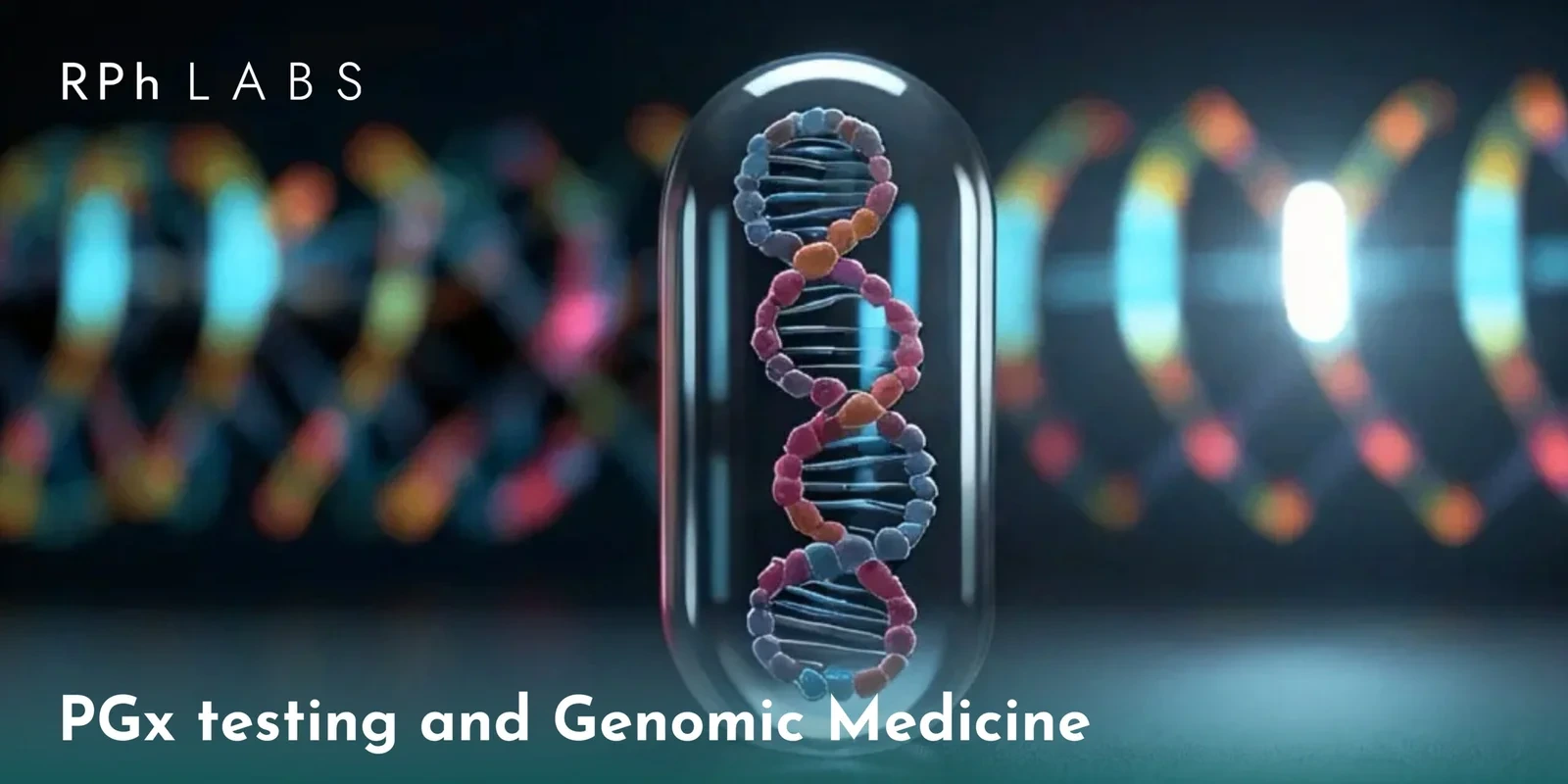
What is a PGx Test and Genomic Medicine?
The history of medication has been working around trials and errors. This not only has proven to sometimes aggravate the condition but even deaths have occurred due to the trials in medications. There has always been a need for medications that don’t affect individuals in a way that worsens their condition. This was only possible if the medications were based on your DNA. Pharmacogenetics is the study of how a person’s genes affect how they respond to drugs. It’s also known as pharmacogenomics, but what is a PGx test?
Pharmacogenomics test commonly known as a PGx test provides you with genomic information (insights into your genome). Genomic Medicine, also known as personalized medicine, is the use of genomic information to improve the diagnosis and treatment of medical conditions.
Genomic Medicine in Depth
Genomic medicine integrates DNA information to enhance the diagnosis and treatment of various medical conditions. By uncovering the genetic basis of diseases, healthcare providers can prescribe tailored medications and dosages, improving treatment effectiveness and reducing adverse effects. This approach has proven particularly beneficial in therapeutic areas such as:
- Oncology: Optimizing cancer treatments based on tumor genetics.
- Cardiology: Customizing heart medications to avoid harmful side effects.
- Psychiatry: Addressing the unique genetic factors influencing mental health treatments.
Genomic Medicine and Mental Health
In mental health, pharmacogenomic testing plays a vital role in optimizing medication therapy. Genetic variations can significantly impact how individuals metabolize and respond to psychiatric medications, affecting their efficacy and the likelihood of side effects. By utilizing insights from genomic medicine, clinicians can bypass the traditional trial-and-error process, prescribing treatments that are more likely to be effective from the outset.
FDA-Labelled Genome-Based Medications
In the case of some mental health medications, the U.S. Food and Drug Administration (FDA) emphasizes the role of pharmacogenomics in improving drug safety and efficacy. Some of the medications that include pharmacogenomic information in their labeling are as follows:
- Warfarin: An anticoagulant, warfarin’s effectiveness and safety are influenced by variations in the CYP2C9 and VKORC1 genes. These genetic differences can affect drug metabolism and sensitivity, requiring dosage adjustments – failure to do so can lead to bleeding risks.
- Clopidogrel: An antiplatelet medication, clopidogrel requires activation by the CYP2C19 enzyme. As per the boxed warning, consider using another platelet P2Y12 inhibitor in patients who are poor metabolizers of CYP2C19.
- Codeine: A pain reliever, codeine is metabolized into morphine by the CYP2D6 enzyme. Individuals who are ultra-rapid metabolizers of this enzyme may experience enhanced effects, including an increased risk of toxicity. According to the FDA-label, “individuals who are ultra-rapid metabolizers may have life-threatening or fatal respiratory depression or experience signs of overdose (such as extreme sleepiness, confusion, or shallow breathing).”
Genome-Based vs. Non-Genome-Based Medications
Traditional approaches to prescribing medications often involve trial and error, which can take more time, cost more, and carry a higher risk of adverse outcomes. Genomic medicine, by contrast, uses genetic insights to streamline this process and achieve better results.
| Aspect | Non-Genome-Based Medications | Genome-Based Medications |
|---|---|---|
| Approach | Trial and error | Personalized based on genetics |
| Time to Effective Treatment | Prolonged due to multiple trials | Shorter, with targeted therapy |
| Cost | Higher due to repeated visits | Lower by avoiding ineffective treatments |
| Health Outcomes | Variable; risk of adverse effects | Improved efficacy and fewer side effects |
At-Home Pharmacogenomic Testing by RPh Labs
RPh Labs offers non-invasive at-home pharmacogenomic (PGx) testing kits that provide insights into how individuals may respond to over 250 medications. Our PGx tests require only a saliva sample, making them safe and easier for users.
The results of PGx tests can help:
- Avoid medications that could cause adverse reactions.
- Identify drugs best suited to an individual’s genetic profile.
- Optimize dosages based on genetic metabolism.
- Minimize the trial-and-error approach to finding effective treatments.
While these tests provide valuable insights, it’s essential to consult with a healthcare provider before making treatment decisions.
Conclusion
The answer to “What is a PGx test” is simple, it’s a test that gives insights into your genome (all your DNA). Medicine based on this data is called genomic medicine or personalized medicine. These personalized medications reduce trials & errors and perhaps have higher efficacy. If you or your loved ones are going through mental health medication or waiting for their prostrate embolization (since warfarin may be administered), talking to a doctor about taking a PGx test before may be vital – here is how it works.
References:
https://accpjournals.onlinelibrary.wiley.com/
https://www.accessdata.fda.gov/drugsatfda_docs/label/2011/009218s107lbl.pdf
https://www.accessdata.fda.gov/drugsatfda_docs/label/2016/020839s062s064lbl.pdf
https://www.accessdata.fda.gov/drugsatfda_docs/label/2021/022402s014lbl.pdf
Disclaimer: This blog is only for informational purposes. Please always consult a doctor before taking any medical action.



Leave a Reply